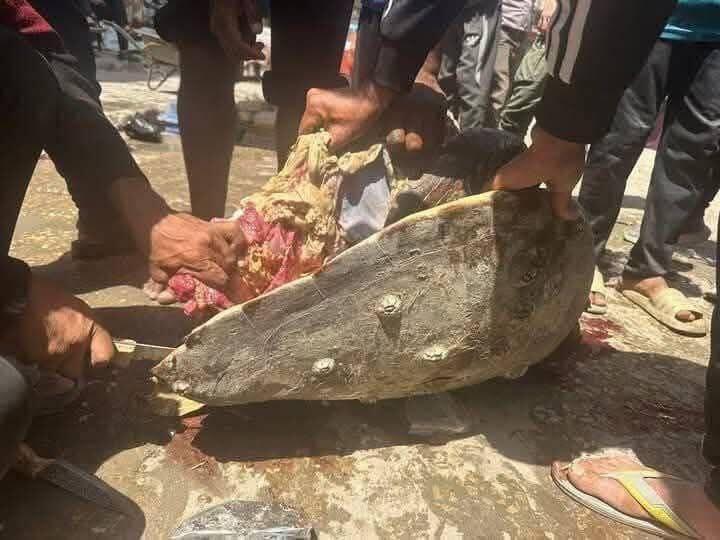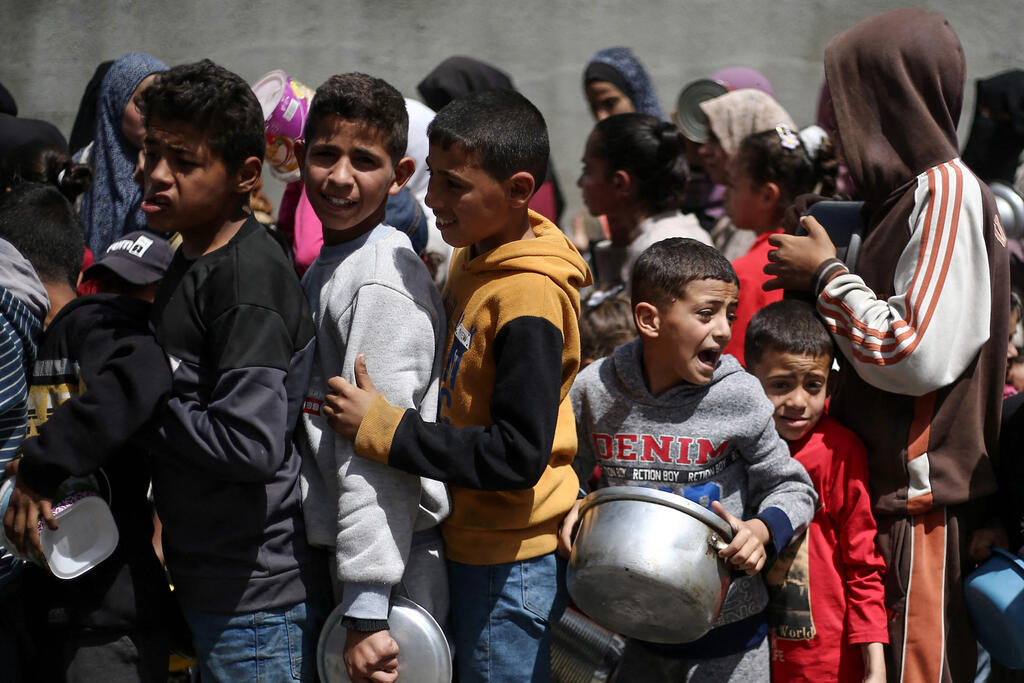The internet in the Gaza Strip has been abuzz over the past 24 hours after residents posted videos of themselves eating horse meat and sea turtles - the latter being a protected species in the region. These videos follow earlier reports of Gazans eating dolphin meat, as well as a Hamas operative consuming shark meat, amid the ongoing war with Israel.
"This is our reality in Gaza today," said a resident of Rafah. "Signs of hunger are becoming increasingly severe in the city," added a resident of Khan Younis.
Gaza resident eating horse
Fishermen in Gaza have been catching sea turtles when they come ashore to lay eggs, with their market price reportedly around $25 per turtle. "Imagine that the situation in Gaza has reached the point where people are eating turtle meat," said Mariam Hossan, a displaced resident of Rafah. "People aren’t eating turtles because they like them, but because there’s nothing else to eat." Inas, a resident of Gaza City, wrote on social media: "People are forced to eat turtles because there’s nothing else to eat. We’re sick of canned food. We deserve to eat."
Mahmoud Saydam, a young man from Gaza City, voiced outrage over the phenomenon: "Have we really reached the point where we eat turtles and horses? The situation in Gaza is dire, but can’t we live without meat? Are we willing to eat anything just to follow trends and make bizarre videos for likes? The situation is painful, but the strangest thing is that some people justify everything to themselves!"
Others defended the practice. A Gazan named Ahmad Alyan filmed himself roasting turtle meat, saying: "We haven’t eaten meat in three months, and today we’re eating sea turtle meat." Kamel Al-Heiki, a resident of Khan Younis who also ate turtle meat, wrote on Facebook: "Signs of hunger are becoming increasingly severe in the city—among men, children, women and the elderly." He described the effects of hunger, including unexplained hair loss, pale faces, cracked hands and feet, thinning skin, constant dizziness, and difficulty moving. "You will hear many reports of people dying from hunger, and the world remains deafeningly silent," he added.
Yosef Al-Masri, a resident of northern Gaza, posted a video in which he ate kebabs made from horse meat. "Stop preaching to us. We’re allowed to eat anything to avoid dying," he said in the video.
International media and aid organizations, including the UN, have been heavily focused on claims of hunger in Gaza due to the war. Israel, however, released an assessment earlier this month stating that "there is enough food and humanitarian aid in Gaza," despite the government’s decision to close border crossings and halt aid deliveries. According to a security source, this is because, during the ceasefire, Israel delivered four times more food to Gaza than before.
COGAT (Coordinator of Government Activities in the Territories) reported that, during the ceasefire with Hamas, which collapsed on March 18, 25,200 trucks carrying approximately 450,000 tons of aid entered Gaza. "This accounts for nearly a third of all trucks that have entered Gaza since the start of the war, in just over a month. There is enough food for a very long time—if only Hamas would distribute it to civilians," read a post from COGAT’s official social media account.
The UN dismissed Israel’s assessments earlier this month, calling them "ridiculous." UN spokesperson Stéphane Dujarric stated that the World Food Program (WFP) is "on the brink," adding: "We don’t shut down bakeries for fun. If there’s no flour and no cooking gas, bakeries can’t operate."
<< Get the Ynetnews app on your smartphone: Google Play: https://bit.ly/4eJ37pE | Apple App Store: https://bit.ly/3ZL7iNv >>
Last week, Defense Minister Israel Katz hinted that Israel is preparing to resume humanitarian aid deliveries to Gaza, as reported by Ynet a week earlier. However, he clarified that this would be done through a future distribution infrastructure involving civilian companies. According to Ynet, Israel is expected to allow humanitarian aid into Gaza within a few weeks, even without a hostage deal or resolution with Hamas.
Shortly after his statement, and amid criticism from within the coalition and from families of hostages, Katz clarified: "As I stated in my announcement, Israel’s policy is clear—no humanitarian aid will enter Gaza." He added: "Preventing humanitarian aid to Gaza is one of the main pressure tools that prevents Hamas from exploiting this resource against the population, alongside other measures Israel is taking. It’s unfortunate that some are trying to mislead."
"No one is currently planning to allow any humanitarian aid into Gaza, and no preparations are being made to do so. I emphasized that for the future, mechanisms must be built to use civilian companies as a tool to ensure Hamas has no access to this issue in the future," Katz concluded.






